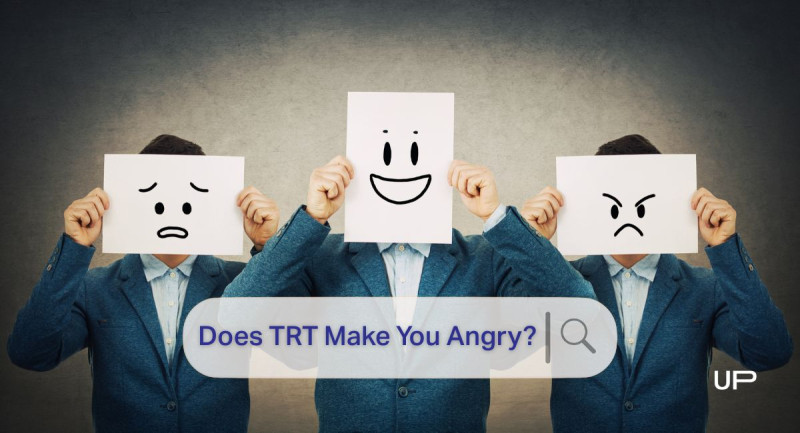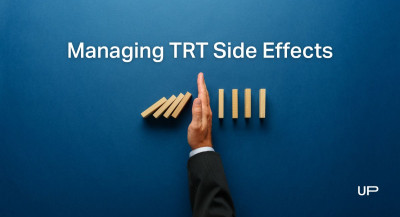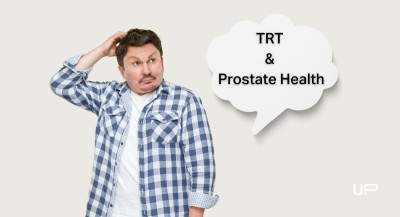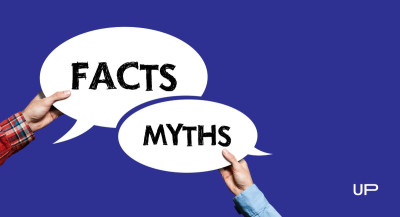TRT And Mood: Does It Really Make You Angry?


For decades, testosterone has been blamed for aggression, rage, and out-of-control behaviour, thanks to pop culture stereotypes, gym lore, and confusion around anabolic steroid abuse.

But for men considering testosterone replacement therapy (TRT) in Canada, this lingering myth can create real hesitation. Many still worry: Will TRT make me angry?
The short answer, backed by current evidence, is no. When prescribed properly, TRT is designed to restore hormone balance—not cause emotional volatility. In fact, studies show that for men with low testosterone, therapy can improve mood, reduce irritability, and boost overall well-being.
It’s time to separate outdated fears from the facts.
Topics covered in this article:
Where the Roid Rage Myth Came From
The idea that testosterone turns men into ticking time bombs largely stems from the misuse of anabolic steroids—not medically supervised testosterone replacement therapy (TRT). In bodybuilding circles, some individuals have used extremely high doses of synthetic testosterone and similar compounds for performance enhancement. These megadoses can disrupt brain chemistry and potentially increase aggression, but they are far removed from the controlled TRT prescribed by healthcare professionals.

Media portrayals haven’t helped. News stories and pop culture often confuse “steroid rage” with any form of testosterone use, reinforcing the myth that all testosterone therapies lead to anger issues. In reality, clinical TRT in Canada is carefully dosed to restore normal hormone levels—not push them to dangerous extremes. The goal is balance, not enhancement.
What the Research Says About TRT and Mood
Contrary to the stereotype, most research shows that testosterone replacement therapy (TRT) tends to support emotional stability rather than disrupt it. For men with low testosterone, properly managed TRT is often linked to improved mood, increased energy, and a better overall sense of well-being.
Several large-scale studies and meta-analyses have found that TRT can significantly reduce symptoms of mild to moderate depression in men with testosterone deficiency. A 2019 meta-analysis published in JAMA Psychiatry concluded that TRT was associated with moderate improvements in mood, especially among men with low baseline testosterone levels and mild depressive symptoms.
Importantly, there's no strong evidence that therapeutic doses of testosterone increase aggression or anger in men. In fact, most clinical trials show no significant change in irritability or hostility when TRT is administered appropriately and monitored by a healthcare provider. In Canada, testosterone replacement therapy is prescribed with careful screening and follow-up to ensure hormones are restored to healthy—not excessive—levels, which helps avoid side effects and emotional swings.
Takeaway: balanced testosterone often improves emotional health rather than harms it.
Mood Monitoring: What to Watch For
While testosterone replacement therapy (TRT) in Canada is generally well tolerated, some men may notice temporary mood shifts, especially in the early stages or if their dosage is not yet optimized. In rare cases, irritability or emotional swings can occur when testosterone levels rise too quickly or fluctuate due to inconsistent treatment schedules.
This is why regular follow-ups and blood work are essential. Your healthcare provider can help identify and correct any hormonal imbalances before they affect your mental health. Journaling your mood, energy, and stress levels in the first few months can also help detect patterns and catch issues early.
Takeaway: If you feel more irritable or emotionally off after starting TRT, it is usually not a sign of "roid rage." It is a signal to fine-tune your treatment with your doctor’s help.

Who May Be at Risk for Mood Swings on TRT?
Most men on medically supervised testosterone replacement therapy (TRT) in Canada report better mood, not worse. However, certain factors can increase the likelihood of mood swings during treatment.
Some individuals may be more sensitive to hormonal changes, particularly those with:
- Pre-existing mental health conditions such as bipolar disorder, untreated depression, or anxiety
- A history of emotional instability or trauma
- Poor sleep or unmanaged stress levels
- Self-adjusted dosing or skipped follow-ups
Improper TRT use, such as taking more than prescribed or not working with a qualified healthcare provider, can lead to unstable testosterone levels. This increases the risk of emotional ups and downs. Without proper monitoring, issues like elevated estradiol or suppressed natural hormone production can go unnoticed.
Takeaway: When TRT is managed responsibly and personalized to your needs, the risk of serious mood disturbances is low. But if you have underlying mental health issues or are not following a monitored treatment plan, you may need closer supervision.
How to Support Mental Health on TRT
Testosterone replacement therapy (TRT) in Canada is most effective when paired with healthy habits that support your overall mental well-being. Hormones play a powerful role, but they are just one part of the picture.
To keep your mood steady and your outlook positive, prioritize these strategies:
- Get consistent, high-quality sleep to support hormone balance and brain health
- Manage stress through techniques like meditation, journaling, or breathing exercises
- Exercise regularly, especially strength training and cardio, which naturally boost mood
- Eat a balanced diet rich in whole foods, healthy fats, and protein
- Avoid excessive alcohol and recreational drugs, which can disrupt hormones and mental clarity
Equally important is staying in touch with your healthcare provider. Regular follow-up appointments allow your doctor to assess hormone levels, adjust dosing if needed, and catch any emotional changes early.
Takeaway: TRT works best when it’s part of a full-body, full-mind approach. By supporting your mental health and staying engaged with your provider, you set yourself up for long-term success.

Conclusion: The Truth About TRT and Mood
The myth that testosterone replacement therapy turns men into angry, irrational versions of themselves is outdated and unsupported by clinical evidence. In fact, research shows that properly managed TRT in Canada can actually improve mood, boost motivation, and help men feel more like themselves again.
While rare mood changes can happen, they are usually linked to improper dosing or pre-existing mental health conditions. With proper medical oversight, regular monitoring, and healthy lifestyle habits, most men find that TRT enhances their emotional well-being rather than harms it.
Takeaway: TRT is not about losing control. It’s about regaining balance, energy, and confidence—with the support of science and expert care.
FAQs – Mood and TRT: Your Questions Answered
Not typically. Clinical doses of testosterone used in TRT do not cause aggression in most men. The “roid rage” myth is linked to abuse of anabolic steroids, not medically supervised treatment.
Yes. Many men report improvements in mood, energy, and mental clarity after starting TRT. Research supports TRT’s potential to ease symptoms of mild depression in men with low testosterone.
Some men experience mild mood changes early in treatment or with incorrect dosing. This is why regular follow-ups and open communication with your provider are essential.
You may still be a candidate for TRT, but it’s important to discuss your mental health history with your doctor. They can monitor your response and adjust your care accordingly.
Prioritize sleep, manage stress, stay active, and maintain open dialogue with your healthcare provider. These habits enhance both your mental health and the effectiveness of your treatment.
References
UPGUYS has strict sourcing guidelines to ensure our content is accurate and current. We rely on peer-reviewed studies, academic research institutions, and medical associations. We strive to use primary sources and refrain from using tertiary references.- The effects of supraphysiological doses of testosterone on angry behavior in healthy eugonadal men--a clinical research center study, PubMed,
https://pubmed.ncbi.nlm.nih.gov/8855834/ - Effect of Testosterone Replacement Therapy on Cognitive Performance and Depression in Men with Testosterone Deficiency Syndrome, PubMed,
https://pmc.ncbi.nlm.nih.gov/articles/PMC5209560/
This article is written for informational purposes only and does not constitute medical advice. The information provided in the articles cannot and should not replace advice from a healthcare professional. Talk to your healthcare provider about any physical or mental health concerns or the risks and benefits of any treatment or medication.





